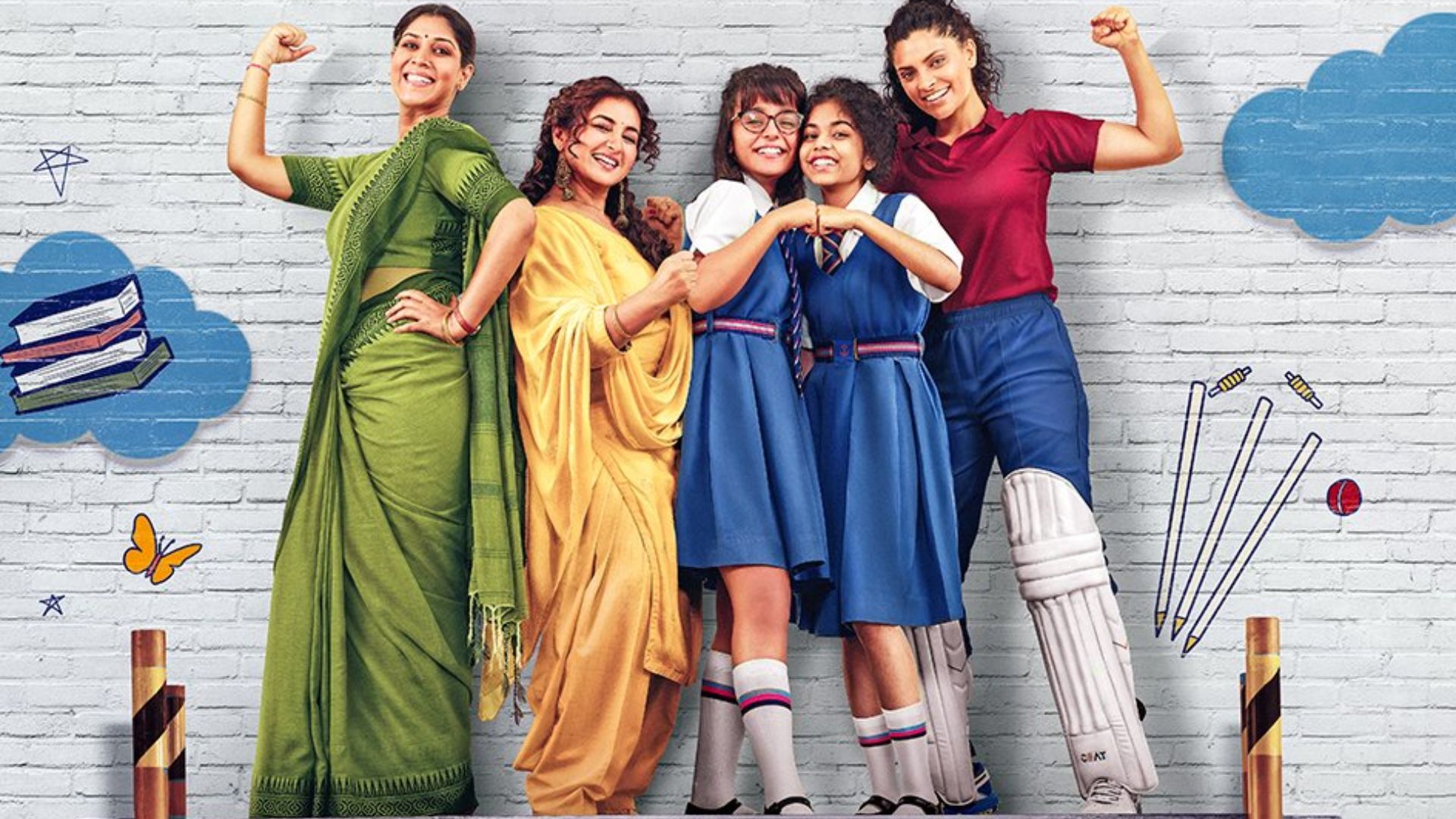“Mai samay hun.” (I am time, immemorial.) These 3 words immediately evoke a sense of nostalgia that comes from hearing the same baritone declaration in the Mahabharata during the late 90s, except this time it is the voice of an omnipresent woman narrator. The tone of the film Sharmajee Ki Beti is set right from the outset; this is a film that is going to be set in the feminine realm.
Sharmajee Ki Beti, written and directed by Tahira Kashyap Khurrana, offers a comprehensive perspective on the female experience across ages by exploring the lives of all its female characters who are united by the surname ‘Sharma.’
Through the course of the film, Sharmajee Ki Beti, we shall see how these different female characters will navigate their various challenges of womanhood, whether it is the performative aspects of their gender identity, the transition from girlhood to womanhood, coming to terms with their sexuality, or choosing their personhood and identity against the constraints of patriarchy.
Married women navigating aspirations and expectations
Jyoti Sharma, played by Sakshi Tanwar, is a career-driven married woman who truly loves and enjoys her profession of giving coaching classes to students. A meticulous planner and an organised person, she tries her best to juggle between her roles of being a wife and a mother on the one hand and fulfilling her dreams and aspirations as a professional.
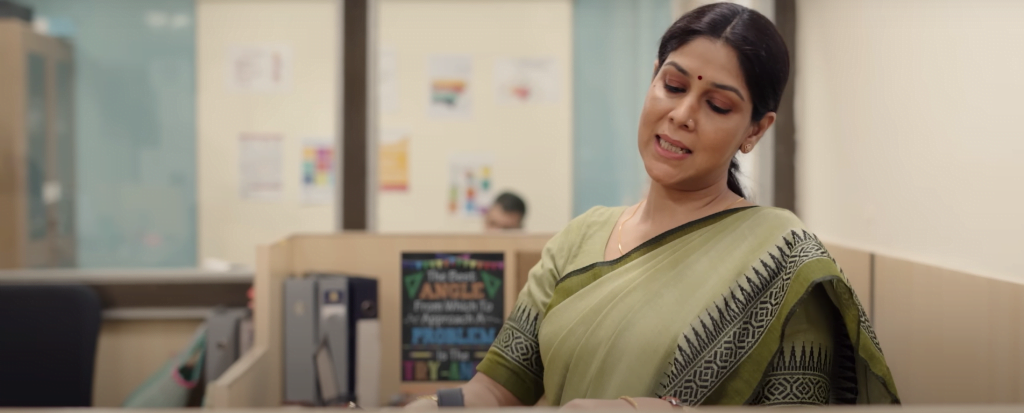
In this regard, her husband, Sudhir Sharma, played by Sharib Hashmi, takes up the domestic chores and, for the most part, looks after the household duties, which provides a helping hand for Jyoti to go all out and focus on her career without being held back by the societal obligations of a married woman. As a married woman professional, her colleagues look down upon her for her career-driven mentality and reduce her hard work to sexist implications.
Her point of conflict arises when, in pursuit of her aspirations, she ends up significantly neglecting her daughter, Swati. The problems of juggling her profession and duties as a mother start showing up, and Jyoti is left apologising over and over again for forgetting to fulfil her promises to her daughter. In the climactic sequence, little Swati is left waiting in the dark for her mother, who had promised to pick her up after school but forgot about it. This key incident results in an emotional outburst by young Swati, who chastises her mother for the negligence of her motherly duties. Her outburst reflects the internalisation of the patriarchal outlook, which expects the mother to be self-sacrificing, looks down on her life outside the family, and condemns the existence of the mother’s own identity and aspirations, which she is not supposed to possess.
Although Jyoti is left significantly hurt by the words, she refuses to be subdued by the restrictive patriarchal expectations and unapologetically defends her own aspirations and personhood. And despite this, she realises her neglect towards her daughter and seeks to make time for her amidst her busy schedule. Finally, Jyoti is rewarded for her hard work and passion on her organisation’s annual day, which makes her young daughter realise the respectable professional identity that her mother has earned, which she had always belittled until then.
Kiran Sharma, on the other hand, played by Divya Dutta, is a small-town woman from Patiala who came to Mumbai after marriage and is caught amidst the urban-elite patronising mindset that looks down on homemakers. Kiran starts off as an insecure homemaker with aspirations who has no room to explore. She cherishes the simplicity and close-knit nature of small town communities, which she is unable to find in the fast-paced and bustling urban life of Mumbai.
Since she finds no room to fulfil her aspirations, Kiran finds an escape in living in her dreamland, where she fantasises about becoming a superhero and getting love from the people, and also fantasises about murdering her negligent husband, who becomes an embodiment of her constraints and the feeling of loneliness. She aspires to have a fulfilling social life and connect with the community, while also wanting to break away from the belittling prejudice associated with homemakers.
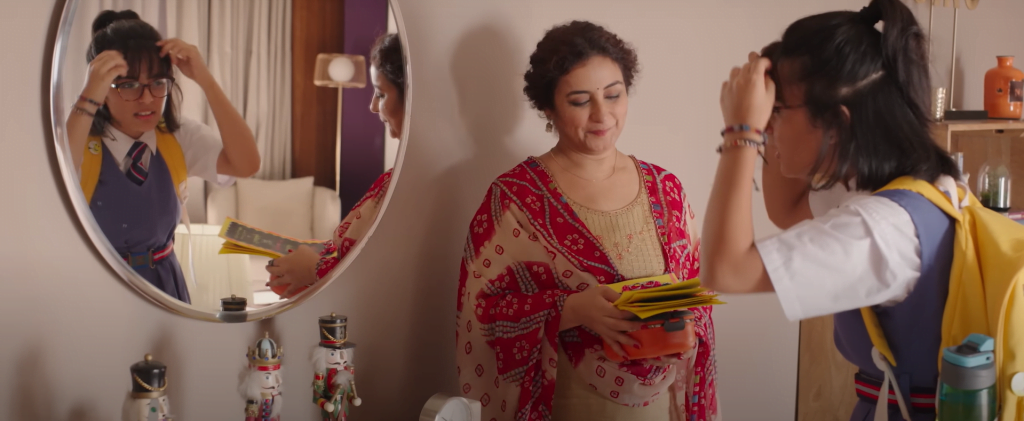
Kiran faces constant rejection in her efforts to establish a connection with everyone around her, including her husband and neighbours. In the climactic sequence, Kiran ends up discovering the infidelity of her negligent husband and undergoes a severe emotional crisis as a result, which amplifies her existing loneliness. While resorting to her dream world as a way to cope, she ends up imaginatively dying by suicide.
However, this imaginative suicide serves as a moment of rebirth for Kiran, who decides to continue trying to live life, this time for herself. She shows her unconditional support towards her daughter, who comes out to her as a lesbian, and also confronts her husband for the infidelity. She comes to terms with his negligence, which she realises is a result of a marriage due to parental pressure. This acceptance comes with forgiveness, which Kiran grants because she has finally accepted herself.
Finally, the unhappy married duo ends up separating, and Kiran is able to live her life the way she wants to, like in her dream world, by asserting her own identity and indulging her aspirations without any constraints holding her back.
Challenging the performative aspects of being a woman in Sharmajee Ki Beti
Tanvi Sharma, played by Saiyami Kher, is an accomplished state-level cricket player and sportsperson who is navigating the challenges of gender identity that come with entering a highly masculinised career field. While performing her gender as a woman, she is expected to be feminine-coded, have delicate and nurturing attributes, take up less space, and have a small appetite.
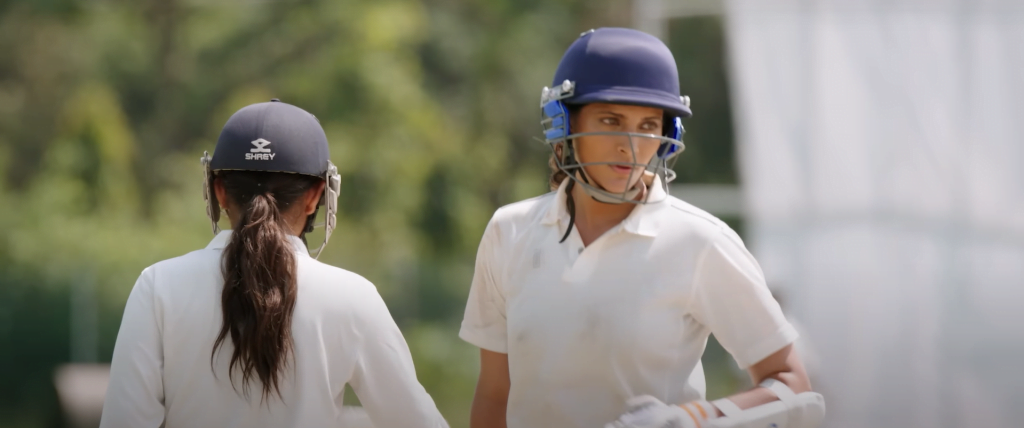
However, the beauty of her own gender performance lies in her androgyny, balancing her ‘masculine,‘ with her ‘feminine,’ not wanting to be rigidly feminine, having a bigger appetite, and having a muscular body.
As a woman in love, she suppresses her true self in hopes of appeasing her boyfriend Rohan, who is constantly threatened by the non-conforming aspects of her identity, which sometimes also overpower his own masculinity. Rohan cracks jokes and makes casual comments that betray his dismissal of her career as a female cricketer, keeps encouraging her to abandon her aspirations, and wants her to rely on him as ‘the man,’ of the relationship. He stifles her identity and pushes her to conform to feminine codes.
“Marriage and kids are a natural progression for women,” Rohan’s mindset is not concealed either, and yet even though Tanvi feels uneasy, she refuses to accept it for what it is out of her love. On the surface, Rohan does claim to love and support Tanvi; however, from an objective view of the relationship, we can clearly see through the misinformed idea of love.
Tanvi’s story ends with her winning more than just a decisive cricket match: she wins herself. As she realises her true passion and love for the sport, she comes to terms with her gender presentation and identity as well. She does not wish to be stifled anymore and be made to fit into moulds she clearly cannot fit into. Despite still having feelings for Rohan, Tanvi chooses herself and walks out of a relationship that clearly shows no respect for her authentic self.
Coming of age and coming to terms with womanhood
Swati Sharma, played by Vanshika Taparia, is a teenage girl plagued by the anxieties of the transition from girlhood to womanhood. Her inability to menstruate, her thin body structure, and her unruly curly hair affect her sense of self-image and are constant preoccupations in her mind. She is discovering her newfound sexuality, striving to become more ‘womanly,’ and viewing the older girls with an aspiring gaze.
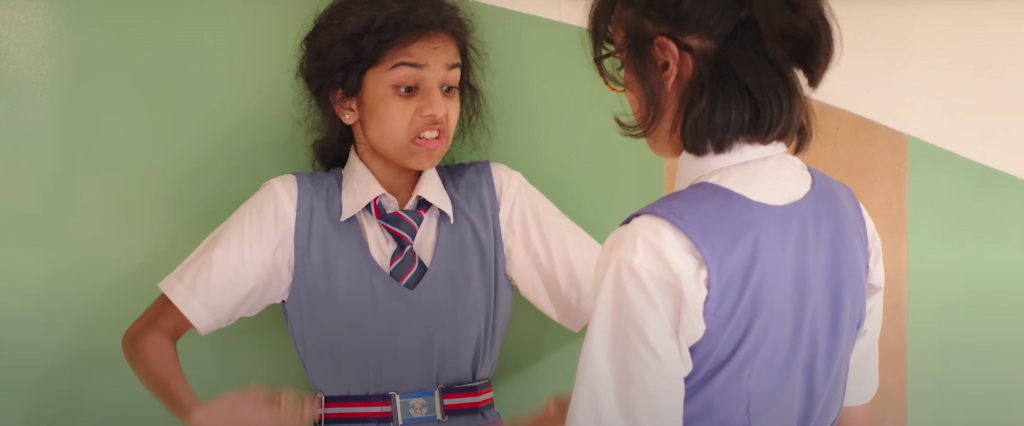
Amidst this turmoil of mental and bodily changes, she feels neglected by her mother, who she believes can help her become her womanly ideal but has no time for her. As a growing teenager, she also harbours the internalised patriarchal mindsets against her mother and feels hostile against her for having a career and life outside of home, believing that the household can run perfectly fine on her father’s income. She fails to understand her mother, and her mother too fails to understand and be there for her growing self.
Amidst navigating between these misunderstandings, she is finally able to accept and acknowledge the value of her mother’s ambitions and career. She opens her heart out to her mother and overcomes her feelings of hostility. She finally gets her period as well, helping her move a major step ahead in the improvement of her self-image.
In all of these new experiences of teenage life, Swati’s constant companion is Gurveen Sharma, played by Arista Mehta, who also seems to admire the senior girl, but for a completely different reason. Gurveen is also conscious of her appearance, especially her bangs, which she seems to fiddle with a lot. While Swati feels dejected at not receiving proposals from boys her age, Gurveen feels repulsed at the prospect. Gurveen is caught admiring a senior boy, but again, for a completely different reason. She is enamoured by the gelled styling of his hair and aspires to achieve the same look.
While accepting these newfound feelings, Gurveen finally comes to terms with her sexuality and realises that she likes girls. She musters the courage to come out to her best friend Swati while fearing judgement and abandonment, but Swati accepts her friend for who she is. Gurveen and Swati are both teenage girls coming to terms with the changes in their bodies and minds and navigating through the challenges of the teenage years together. Their friendship becomes a display of female solidarity and companionship. Gurveen then decides to come out to her mother as well, whom she thought would not be able to understand, yet her mother shows unconditional love and support for her daughter. Rather, her mother tells her that she had known all along and gives her a hair gel as a coming-out gift. Gurveen is also able to move further up the ladder of self-acceptance as a teenage girl.
Sharmajee Ki Beti was able to portray a very nuanced depiction of the middle-class female experience across ages. It was clear from the portrayals that such nuances can come from only a woman director and writer. The omnipresence of femininity and womanhood throughout the film, Sharmajee Ki Beti, offers a great watching experience that is not only lighthearted but also deep in its exploration of the themes of gender, identity, and society.
About the author(s)
Sarah (She/Her) is your local student journalist and writer pursuing her Bachelor's in Literature from Delhi University. She seeks to strike a balance between a chaotic chronically online gen-z and an insatiable learner. At the risk of coming across as cheesy, she quotes Oscar Wilde on being asked to introduce herself, "To define is to limit."
